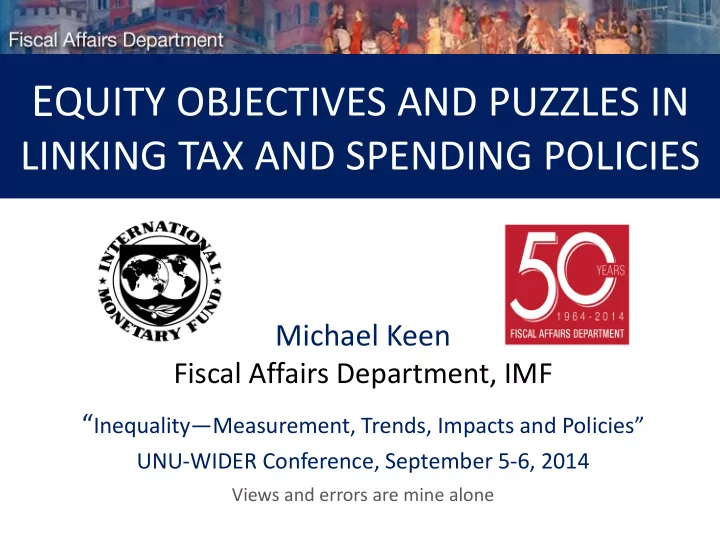

E QUITY OBJECTIVES AND PUZZLES IN LINKING TAX AND SPENDING POLICIES Michael Keen Fiscal Affairs Department, IMF “ Inequality—Measurement, Trends, Impacts and Policies” UNU-WIDER Conference, September 5-6, 2014 Views and errors are mine alone
• Whether the equity-efficiency frontier slopes up or down, we want to be on it • For distributional impact, it is (only) the joint impact of taxes and spending that matters – ‘progressivity’ of individual items not in itself very informative – We are bad at taking this holistic view • (Incidence—We know very little about even the simplest instruments let alone the more complex ones)
THE PUZZLE
Generalized price support can be a very badly targeted way to support the poor Because although the poor may spend a larger proportion of their income on, say, food or fuel, the rich spend absolutely more —so most of the dollar benefit (revenue foregone) goes to them Plenty of examples….
Example 1: Reduced rates of VAT • Zero rate on food in Mexico: 25 20 15 10 5 0 I II III IV V VI VII VIII IX X Percent of total subsidy Percent of income
Example 2: Petroleum subsidies Kerosene Gasoline 2 1 3 6 1 9 1 0 2 0 2 0 1 9 6 1 2 1 Diesel LPG 7 4 8 1 2 4 2 1 3 1 6 5 4 2 1 2 3
But the question is: Maybe these heavy costs are a price we have to pay for equity objectives? Real issue is: Are there better targeted ways to support the poor? Benefit to poor from subsidies can be sizable: – E.g. $0.25 per liter increase in fuel prices can reduce real consumption of poorest 20 percent by 5.5 percent
For advanced economies, answer is/should be “Yes” For zero rating of food in the U.K.: 4 2 With 0 compensation -2 Without compensation -4 -6 -8 -10 Decile group by equivalent disposable income …using up only about half of the revenue gain
What about emerging/developing? Only blunter spending instruments available, so policy case for rate differentiation stronger —but how strong?
A condition Suppose ‘maximin’ concern only with very poorest Leaving aside behavioral effects, poorest gain from increasing rate on ‘food’ if and only if: Proportion of all food they consume Is less than (Proportion of $1 of public spending from which they benefit) × (Their valuation $1 of such spending, λ )
Example 1: Cash transfers ( λ =1), For a cash transfer, condition is simply that consumption share lower than share in total cash benefits • For a poll subsidy, this must be the case if their consumption is below the average – Iran • And even more likely to be case if some element of pro-poor element in cash transfers
Example 2: In-kind benefits (maybe λ≥ 1) In India example below, bottom 20 percent benefit from increased spending on curative health care if they account for less than 10 percent of ‘food’ consumption even if λ =1 —and a fortiori if λ > 1 40.0% 33.1% 30.0% 25.6% 20.0% 17.8% 13.4% 10.1% 10.0% 0.0% Poorest 2nd Middle 4th Richest 20% 20% 20%
The moral seems to be: Price subsidies may be so badly targeted on poor that spending doesn’t have to be very well targeted to be a better way to help them —e.g. Ethiopia work (more needed!) Many qualifications: – Inferior goods – Some price subsidies may be even more poorly targeted: e.g. role of VAT thresholds – Always someone who can’t be protected
SO WHY DO AREN’T BETTER TARGETED POLICIES ADOPTED?
Efficiency considerations? E..g. U.K. reform above would raise effective marginal tax rates over some range • But in wider optimal tax context, question (for advanced economies) is whether low taxed goods are relatively strong substitutes for ‘leisure’ —not strong evidence • Arguments for emerging/developing —little explored
Political economy to the fore… • The beneficiaries are powerful! • Distrust that spending benefits will be sustained • Cultural sensitivities – Sense that natural resources are ‘ours’ – In UK, taxing food political death poison since the Corn Laws • Inefficient policies as a signal of politician’s pro-poor preferences? • Stigma of income testing
WAYS AHEAD?
Can crises help? Value-Added Tax Changes in Advanced Economies: 2010-13 • Didn’t in advanced economies (right) 60 Share of Advanced Ecoomies (Percent) 50 Increase • In other cases, 40 Decrease support can 30 become fiscally 20 unsustainable: —recent subsidy 10 reduction in Egypt 0 Rate Base
Transparency • Assessment of revenue foregone (tax expenditure analysis) and distributional impact necessary for informed discussion – And still much to do on this • But clearly not sufficient for policy change – E.g. No mystery about zero-rating issue in U.K.
Earmarking? • For example – Ghana raised VAT standard rate from 10 to 15 percent earmarked to education and health • But either: (a) Constrains spending or (b) Is misleading and non-transparent • Last resort? • Links with PFM reform?
Lessons from subsidy reform? – Comprehensive, detailed reform plan – Far-reaching communications strategy – Consider sequencing reform, to build up trust
The possibilities are changing • Biometric cards in principle facilitate poll subsidies • Targeting by income or cruder indicator of needs – SNAP (‘food stamps’) in US • Retailers prohibited from charging any tax – Becoming feasible elsewhere: Egypt experiment with income-tested limit (5 loaves per day) on access to subsidized bread; excess can be spent on other things …as transition to removal?
Recommend
More recommend